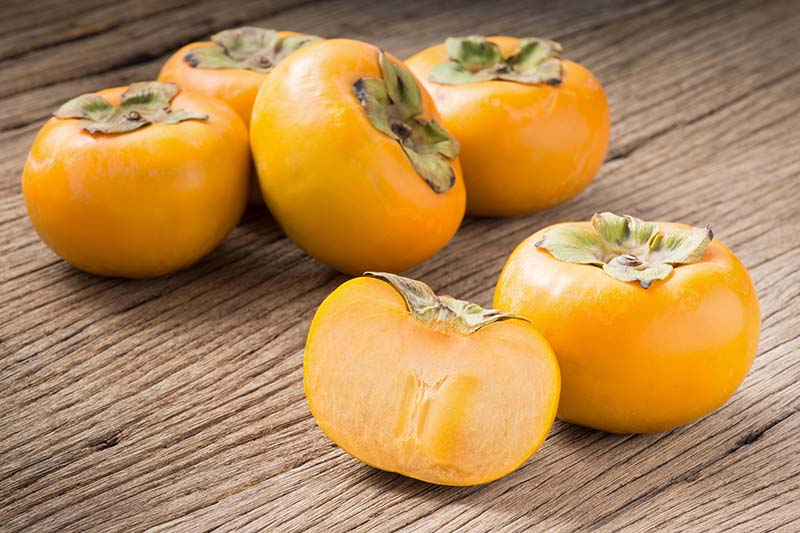Persimmons are a sweet, juicy fruit that is enjoyed by many people around the world. However, when it comes to dogs, pet owners may wonder if it is safe to share this tasty treat with their furry friends. The answer is yes, dogs can eat persimmons, but there are some important considerations to keep in mind.

One of the main concerns with feeding persimmons to dogs is the high sugar content. While dogs can safely consume sugar in moderation, too much can lead to a variety of health problems, including obesity and diabetes. Additionally, persimmons contain seeds that can be a choking hazard or cause intestinal blockages if ingested. Therefore, it is important to remove the seeds and only offer small amounts of the fruit as an occasional treat.
Can Dogs Safely Eat Persimmons?
Persimmons are a sweet and juicy fruit that are safe for dogs to eat in moderation. They are a good source of vitamins and minerals, including vitamin A, vitamin C, and antioxidants. However, there are some potential risks and side effects to be aware of when feeding persimmons to dogs.
Health Benefits of Persimmons for Dogs
Persimmons are a good source of fiber, which can help dogs with digestion and regulate bowel movements. They also contain antioxidants, which can help boost the immune system and reduce inflammation in the body.

In addition, persimmons are high in vitamin A, which is important for maintaining healthy skin and eyesight. They also contain vitamin C, which can help support the immune system and protect against disease.
Potential Risks and Side Effects
While persimmons are generally safe for dogs to eat, there are some potential risks and side effects to be aware of. The seeds and pit of the persimmon can be a choking hazard for dogs, so it is important to remove them before feeding the fruit to your dog.
In addition, persimmons are high in fiber, which can cause gastrointestinal upset if your dog eats too much. This can lead to vomiting, diarrhea, and abdominal pain. If your dog experiences these symptoms after eating persimmons, it is important to seek veterinary care immediately to prevent any serious consequences.
Finally, persimmons can cause intestinal blockages in dogs if they eat too many of them or if they eat the seeds or pit. This can be a serious condition that requires emergency veterinary care to remove the blockage.
Overall, persimmons are a safe and healthy treat for dogs when fed in moderation and with caution. It is important to remove the seeds and pit and monitor your dog for any signs of digestive upset or blockages.
Understanding Persimmons
Persimmons are a sweet fruit that come in a variety of flavors and textures. They are known for their unique taste and antioxidant properties. In this section, we will explore the nutritional profile of persimmons and the different varieties available.
Nutritional Profile
Persimmons are rich in vitamins and minerals, making them a healthy addition to any diet. They are particularly high in vitamin C, fiber, and potassium. Vitamin C is important for a healthy immune system, while fiber helps to keep the digestive system running smoothly. Potassium is essential for maintaining healthy blood pressure levels.
In addition to these nutrients, persimmons also contain antioxidants such as beta-carotene and lycopene. These antioxidants help to protect the body against damage from free radicals, which can contribute to the development of chronic diseases.
Varieties of Persimmons
There are several different varieties of persimmons, each with its own unique flavor and texture. The most common varieties are Fuyu, Hachiya, and Sharon.

Fuyu persimmons are small, round, and firm. They have a sweet, crisp flavor and can be eaten fresh or dried. Dried Fuyu persimmons are often used in baking and cooking.
Hachiya persimmons are larger and have a more oblong shape. They are softer than Fuyu persimmons and have a more astringent flavor. Hachiya persimmons are best eaten when they are fully ripe and soft.
Sharon fruit, also known as persimmon berries, are a newer variety of persimmon that are smaller and sweeter than other varieties. They have a thin skin and can be eaten fresh or dried.
In conclusion, persimmons are a healthy and delicious fruit that can be enjoyed in a variety of ways. Whether you prefer fresh persimmons, dried persimmons, or cooked persimmons, there is a variety to suit your taste.
Feeding Guidelines
When it comes to feeding persimmons to dogs, there are a few guidelines that should be followed to ensure that the fruit is safe and healthy for them to consume.
Preparing Persimmons for Dogs
Before feeding persimmons to dogs, it is important to properly prepare them. First, make sure to wash the fruit thoroughly to remove any pesticides or dirt that may be present on the skin. Then, remove the stem and the seeds from the fruit, as they can be a choking hazard for dogs. Finally, cut the persimmon into small pieces that are easy for your dog to chew and digest.

Serving Size and Frequency
Persimmons can be a great addition to a dog's diet as an occasional treat or snack. However, it is important to remember that moderation is key. Too much of any new food can upset a dog's stomach and cause digestive issues. As a general rule of thumb, it is recommended to only feed persimmons to dogs in small amounts, and no more than once or twice a week.
It is also important to note that persimmon skin can be difficult for dogs to digest and may cause stomach upset. Therefore, it is best to remove the skin before feeding persimmons to your dog.
Overall, persimmons can be a healthy and tasty treat for dogs when prepared and served correctly. As with any new food or treat, it is important to introduce persimmons to your dog's diet slowly and in small amounts, to ensure that they do not have any adverse reactions.
Potential Health Concerns
While persimmons are generally safe for dogs to eat, there are some potential health concerns to keep in mind.
Signs of Intestinal Blockage
One of the primary concerns with feeding persimmons to dogs is the potential for intestinal blockages. As discussed in the previous section, the seeds and skin of persimmons can be difficult for dogs to digest and may cause obstructions in their digestive system.
If your dog has eaten persimmons and is experiencing symptoms such as vomiting, diarrhea, or abdominal pain, it is important to seek veterinary care immediately. These could be signs of an intestinal blockage, which can be a serious and potentially life-threatening condition if left untreated.
Allergic Reactions and Toxicity
While persimmons are not inherently toxic to dogs, some dogs may have an allergic reaction to them. Signs of an allergic reaction may include itching, hives, swelling, or difficulty breathing. If your dog experiences any of these symptoms after eating persimmons, it is important to seek veterinary care immediately.
Additionally, some persimmons may be treated with pesticides or other chemicals that could be toxic to dogs. If you suspect that your dog has ingested a toxic persimmon, seek veterinary care immediately.
Overall, while persimmons can be a healthy and nutritious treat for dogs in moderation, it is important to be aware of the potential health concerns and to monitor your dog closely after feeding them persimmons. If you have any concerns about your dog's health or digestion, consult with your veterinarian.

When to Consult a Veterinarian
If a dog eats too many persimmons or shows any signs of discomfort after consuming them, it is essential to contact a veterinarian right away. In this section, we will discuss the situations when a veterinarian's advice is necessary.
Emergency Situations
If a dog eats a toxic persimmon, it can lead to vomiting, diarrhea, and abdominal pain. In severe cases, it may cause intestinal blockages, which can be life-threatening. If a dog shows any such symptoms after consuming persimmons, it is a medical emergency, and the owner should immediately seek professional help.
Professional Dietary Advice
Although persimmons are safe for dogs, it is crucial to keep in mind that every dog has unique dietary needs. Some dogs may be allergic to persimmons or may have underlying medical conditions that can be aggravated by consuming them. Therefore, it is always best to consult a veterinarian before introducing new foods to a dog's diet.
A veterinarian can provide professional dietary advice and determine how much persimmon a dog can consume safely. They can also recommend other fruits that are safe for dogs and provide health benefits. Overall, consulting a vet can help ensure that a dog's diet is balanced and meets their nutritional needs while avoiding any risks to their health.
In summary, it is essential to monitor a dog's health after they consume persimmons. If a dog shows any signs of discomfort or medical emergency, it is necessary to contact a veterinarian immediately. A veterinarian can provide professional dietary advice and ensure that a dog's diet is balanced and meets their nutritional needs.

Alternative Fruits for Dogs
When it comes to feeding dogs fruits, it's important to choose the right ones to ensure their safety and health. In addition to persimmons, there are several other fruits that can make a great snack or sweet treat for dogs.
Safe Fruit Options
Apples, bananas, and berries are all great options for dogs. Apples are high in fiber and vitamins A and C, while bananas are rich in potassium and low in sodium. Berries, such as strawberries and blueberries, are packed with antioxidants and vitamins.
Watermelon is another great fruit option for dogs. It's low in calories and high in vitamins A, B6, and C. However, it's important to remove the seeds and rind before feeding it to your dog.
Fruits to Avoid
Grapes and raisins should be avoided at all costs, as they can cause kidney failure in dogs. Avocado is another fruit that should be avoided, as it contains persin, which can be toxic to dogs.
In addition, citrus fruits such as oranges and lemons can cause stomach upset in dogs, so it's best to avoid them as well.
Overall, it's important to remember that fruits should only be given to dogs in moderation. While they can make a healthy and tasty snack, too much of a good thing can have negative consequences.
Conclusion:
In conclusion, persimmons can be a healthy treat for dogs when fed in moderation and with proper precautions. They provide beneficial vitamins and antioxidants but also come with risks like high sugar content, choking hazards, and potential for intestinal blockages. It's crucial to remove seeds and skin before feeding and monitor for any adverse reactions.
Consulting a veterinarian before introducing persimmons or any new food to a dog's diet is recommended. Additionally, safe fruit alternatives such as apples, bananas, and berries can offer similar benefits while avoiding the risks associated with persimmons.




